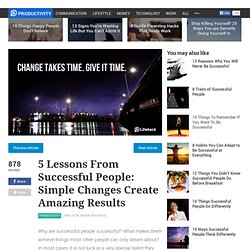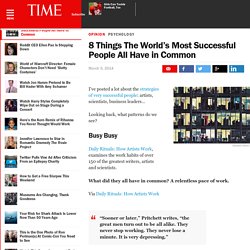

Manage Your Energy. E-learning. Major Religious groups. mBanking and financial inclusion. PDF/Ebooks. Professional Learning. World wonders. Time to share. Hacking. Critical Thinking. Crowdfunding. Financialization. Herbs and Other Natural Cures. Productivity Strategies. Productivity Strategies. MicroFinance. Positivity. s243a. Interview - The top Wharton Business School professor teaches you the right way to approach give and take. 15 Abilities You Must Have to Get Out of the Rat Race. Did you know that FORTY percent – 40% – of young people want to be their own boss someday?

That’s a LOT of aspiring entrepreneurs. Millions, in fact. Truth is, only a fraction of those people ever really start a business. Some get comfortable in a lifestyle that they can’t afford to give up. Others realize just how hard it is to be an entrepreneur and never try. Of the few that actually try to start a business, many fail. Be a Salesperson Never underestimate how important it is to be able to sell.
Delay Gratification No business is successful on day one. Discipline Discipline isn’t just about working hard, but you do have to do that. Take Risks Build Rapport Note that this is not called ‘Making Friends’ – important, yes, but not the same thing. Be a Leader While you may be a natural born follower, as a business owner, you will have to be able to lead. TED Playlists. 5 Lessons From Successful People: Simple Changes Create Amazing Results. Why are successful people successful?

What makes them achieve things most other people can only dream about? In most cases it is not luck or a very special talent they have. Sure, it may seem that way, but when you look at it more closely (and you ask them), things turn out quite differently. Let’s explore. When I study successful people by reading biographies and by talking with them, I see a clear pattern in their actions. Here are five things you should take into account in order to create amazing results in your life. 1. Don’t do something today and stop doing it tomorrow. Usually people say that on average habits are changed in about 3 to 4 weeks. And with all this marathon living, you can of course take a few sprints every now and then. 2. I believe people are by nature lazy creatures. There are lots of amazing ideas, tips and techniques right under your nose, you just have to take action. 3. 6 Lessons of Success We Can All Learn from Dale Carnegie. Dale Carnegie was a successful and famous writer and lecturer on self-development who also developed popular courses to improve public speaking, interpersonal skills and salesmanship.

He is the author of many well-received books including “How to Win Friends and Influence People”, “How to Stop Worrying and Start Living” and “Lincoln the Unknown”. Dale Carnegie rose from a humble farm background in Missouri to become successful and renowned all over the world. He advised that you can change other people’s attitude and behavior towards you by reacting positively towards them. In this article, we look at six valuable lessons we can glean from Dale Carnegie’s life and body of work. 1. Do not settle for mediocrity or set your sights too low. 8 Things The World’s Most Successful People All Have in Common. I’ve posted a lot about the strategies of very successful people: artists, scientists, business leaders… Looking back, what patterns do we see?

Busy Busy Daily Rituals: How Artists Work, examines the work habits of over 150 of the greatest writers, artists and scientists. What did they all have in common? A relentless pace of work. Via Daily Rituals: How Artists Work “Sooner or later,” Pritchett writes, “the great men turn out to be all alike. What did Stanford professor Jeffrey Pfeffer find when he looked at high achievers like LBJ and Robert Moses?
60-65 hour work weeks were not uncommon. Via Managing With Power: Politics and Influence in Organizations: In a study of general managers in industry, John Kotter reported that many of them worked 60 to 65 hours per week–which translates into at least six 10-hour days. When Mihaly Csikszentmihalyi studied geniuses for his book Creativity, he realized something fascinating about IQ. (More on the work habits of geniuses here.) Just Say No Build Networks. Six Keys to Being Excellent at Anything - Tony Schwartz.
By Tony Schwartz | 2:21 PM August 24, 2010 I’ve been playing tennis for nearly five decades.

I love the game and I hit the ball well, but I’m far from the player I wish I were. I’ve been thinking about this a lot the past couple of weeks, because I’ve taken the opportunity, for the first time in many years, to play tennis nearly every day. My game has gotten progressively stronger. I’ve had a number of rapturous moments during which I’ve played like the player I long to be. And almost certainly could be, even though I’m 58 years old. During the past year, I’ve read no fewer than five books — and a raft of scientific research — which powerfully challenge that assumption (see below for a list). We’ve found, in our work with executives at dozens of organizations, that it’s possible to build any given skill or capacity in the same systematic way we do a muscle: push past your comfort zone, and then rest. That notion is wonderfully empowering.